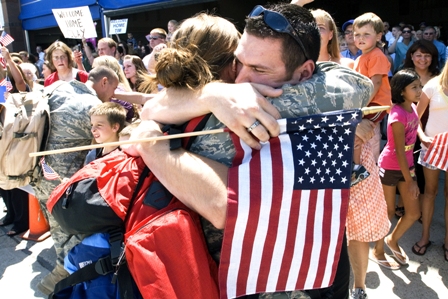Disabled veterans' firms get a boost from California
Recent changes encourage awarding more contracts to
such companies.
By Cyndia Zwahlen
February
22, 2010
With thousands of service members returning home to
California after serving in Iraq and Afghanistan, a new push is underway
to help disabled veterans get more work -- especially those who own or
are launching small businesses.
"These guys coming back need a
start," said Robert Brown, a disabled veteran who owns a business in San
Clemente and is president of the California Disabled Veterans Business
Alliance.
U.S. veterans -- particularly disabled ones -- are
eligible for a wide variety of government benefits for medical care,
housing and education. In California, efforts to award more state
contracts to small businesses owned by service-disabled veterans have
been getting more attention recently.
"The idea here is to help
them succeed and make a successful transition from the military to
civilian life -- to productive, taxpaying employers who can hire
people," said J.P. Tremblay, deputy secretary for legislation and
communications at the California Department of Veterans Affairs. Many
veteran-owned businesses hire other former service members, he noted.
Although
the overall number of California veterans has declined from 2.3 million
to just less than 2.1 million in the last few years, the state's number
of combat veterans has increased. And a higher proportion of them are
disabled -- because medical technology has improved the odds of
surviving severe injuries, Tremblay said.
In all, there are
243,443 veterans in California receiving monthly disability
compensation, according to the U.S. Department of Veterans Affairs. And
1,119 businesses owned by disabled veterans are registered with the
state.
California has long had a goal to award at least 3% of its
contract dollars to businesses owned by disabled veterans. It has not
yet met that goal, advocates said, but it may be close. The figure is
expected to be about 2.97% for fiscal year 2009.
Activists are
hopeful about the year ahead. Financial incentives have been on the
books since 2006 to boost state agencies' use of businesses owned by
disabled veterans.
Now, two recent developments are expected to
help disabled-veteran business owners tap into more of the roughly $9
billion California spends each year on contracting and purchasing.
One
new law took effect Jan. 1. It requires proof from companies that win
state contracts that they made good on their promises to use
disabled-veteran-owned businesses as subcontractors. If they can't, they
face penalties of up to $25,000.
The other legal change,
approved last summer, eliminated a controversial provision of state law
that critics said allowed the contractors to get around a requirement
that they use businesses owned by disabled veterans.
Called the
"good-faith effort" provision, it let companies submit a form saying
they had tried in good faith to hire firms owned by disabled veterans,
even if they didn't succeed.
The elimination of the
good-faith-effort provision was good news for Americal Contractors
Corp., a painting company based in Pomona. The change took effect July
28. Within a week, co-owner Doug Nye said, Americal got its first state
contract.
Now the firm has $556,000 in contracts on the books
and an additional $270,000 out to bid, said Nye, a Vietnam War veteran
and former real estate broker who started Americal in 2008.
"It
has turned our business around," Nye said. He said the new revenue would
allow Americal to double its workforce to 70 painters by the end of the
year.
Not every disabled-veteran-owned business is expected to
benefit so quickly, but activists are optimistic about the changes. "All
the pieces are now working together," said Richard Dryden, executive
director of the California Disabled Veterans Business Alliance in
Sacramento.
 A welcoming home for our Troops.
A welcoming home for our Troops.

